The Ultimate Keyword Research Guide for Small and Medium Businesses
If your business relies on organic traffic as one of its main sources of customers and leads (most small and medium businesses do!), then you just can’t not care about keyword research.
Without giving keyword research for your business the attention it needs, you’re likely restricting your business’ growth yourself.
So without making you feel more guilty about that, let’s walk you through an in-depth keyword research guide that will help you make yourself feel proud by growing your business through increased targeted organic traffic.
What Exactly Do We Mean by Keyword Research?
Keyword research is basically finding the keywords relevant to your products or services that your potential customers or target audience is searching for.
This is typically the foundation of any SEO campaign as unless you find the search terms your target audience is using to search for your products or services, you will likely never show up for those search terms in the search results, or show up much lower in the rankings than you would if you optimized your content for those keywords.
Importance of Keyword Research
As we just said, keyword research is the foundation of an SEO campaign. However, there’s more to it.
The right kind of keyword research can also help businesses discover new products or services they can get into or new markets they can enter.
Another advantage of doing keyword research the right way is that you can start getting more targeted traffic by just optimizing better for the keywords you’re already ranking for.
Let us explain using an example. Say a Houston personal injury lawyer’s website is ranking for the keyword “work injury lawyer Houston” without they even knowing about that keyword or optimizing for it.
However, now that they found out about this keyword, they can optimize their ranking page in Google better for this keyword, and it would most certainly start ranking much higher. This would help the lawyer start getting much more targeted traffic without doing any more SEO to it.
Then there’s also the fact that keyword research can help you achieve a better conversion rate. When someone lands on your website through Google by searching for a particular term and they find the content to be highly targeted, they would be more likely to turn into a customer than if they found similar content but loosely targeted around what they searched for in Google.
There are many other benefits of keyword research, but you get the idea already.
Understanding the User Intent
Before diving deep into the nitty-gritty of keyword research techniques, it’s important to understand that the user intent tends to be a crucial factor when doing your keyword research.
So what exactly do we mean by “user intent”? Well, simply put, it tells us what’s the intention of the user searching for a particular term in Google.
Let an example help us again. Here the user is searching for “best washing machine” in Google.
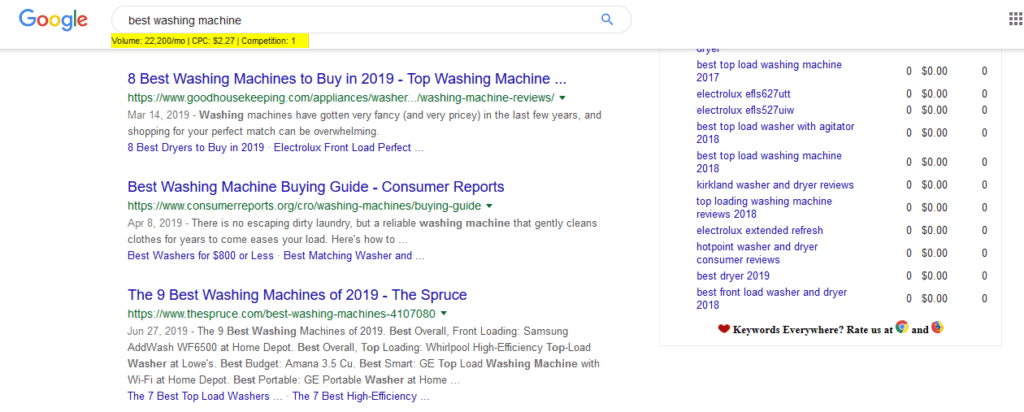
Despite it being a product-specific keyword, you don’t see sites like Amazon in the top results, but rather blog-themed sites that are not selling the product but simply talking about it.
Reason? Google knows the user isn’t looking to make a purchase yet despite searching for a product related keyword. When a user searches for “best washing machine,” they want to find out what are the best options in the market right now.
This is the reason you see blog-themed sites with informative content ranking for this keyword and not ecommerce sites like Amazon.
This is important to keep in mind as if you fail to understand the user intent, you may not be able to rank for your desired keywords even if you optimize for them.
Do not be afraid of writing informative content to target the keywords that are looking for more information even if you want to sell your products or services. Remember that you can always build a conversion funnel to drive them to your product or lead pages to convert them into a customer or a lead.
Furthermore, ranking for informative keywords, too, over time, helps you build your website’s authority and makes you more likely to rank for the more commercial intent keywords.
Keyword Research Tools
Now that you know everything you need to know about keyword research except doing keyword research itself, it’s time to get to that.
And when it comes to keyword research, some tools turn out to be a big help. Without those tools, it would be hard to do “complete” keyword research unless you’re in a tiny niche with a handful of keywords you can find manually.
So here’s a quick look at some important keyword research tools.
Keywords Everywhere
This is a free tool and a super convenient, easy and quick way of doing keyword research, so it’s a no-brainer to get. It’s available for both Mozilla Firefox and Google Chrome.
You can see Keywords Everywhere in action in the screenshots we shared above. It does the following things:
- Show you the keyword volume for the keywords you search on Google
- You can choose the country you would like to target (7 countries available right now) or choose to go global depending on your target audience
- You would find many “related” keywords on the right side of your search page, which is how you can discover many new keywords and opportunities
- You can also see the search volume for the keywords Google puts as a suggestion at the bottom
- Some more cool features too, but these are enough to get you pumped for now
SEMrush
If you’re in a large niche with a lot of keywords to target and many competitors to compete with, SEMrush can give you a head start.
You can find all the keywords your competitors are ranking for by putting them into the tool and performing a search. Similarly, you can also put your own site into the tool and see what keywords it ranks for, and then optimize for the right keywords to move higher in the rankings for those keywords.
It does have a free trial but it’s a paid tool. But if you don’t need to use it regularly, the free trial would likely be enough for you and you can cancel your subscription before the trial ends and SEMrush charges your card.
Google Keyword Planner
It doesn’t make sense to not consider Google itself when trying to get targeted traffic from it. And you can get plenty of keyword ideas with the Google Keyword Planner as well, although you wouldn’t get the exact searches if you haven’t paid for any ads.
How to Find the Right, Relevant Keywords?
As we said above, Keywords Everywhere makes keyword research much easier for beginners. So let us walk you through an easy keyword research technique using the tool.
This technique involves searching for your most obvious keyword and taking it from there.
Let’s take the example of the same personal injury lawyer in Houston we used above. If you were a personal injury lawyer based in Houston, the most relevant, obvious keyword for you would be “personal injury lawyer Houston.” However, just by searching for this keyword and using the data provided by Keywords Everywhere, you can discover many more opportunities that are relevant to your field of expertise and can help your business grow.
Here’s what we are talking about:
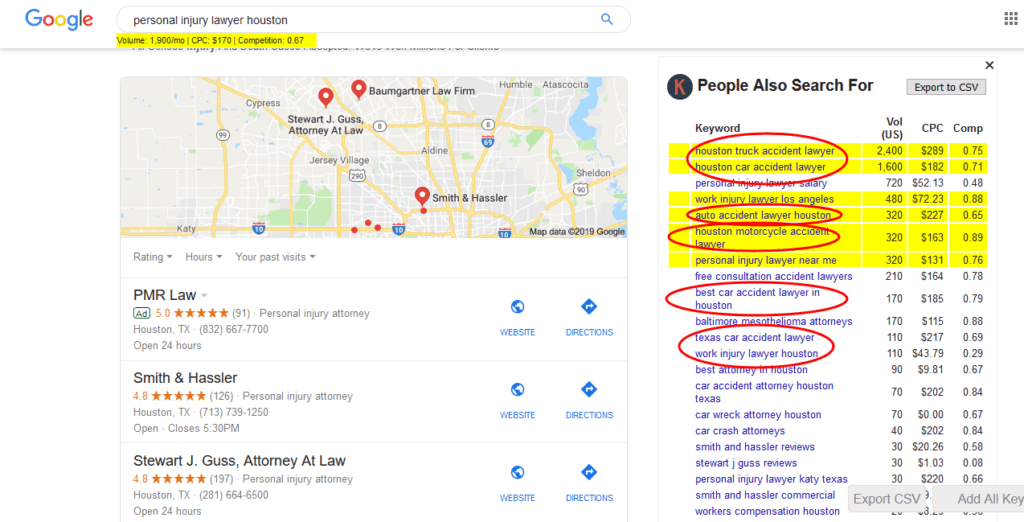
While the main keyword is “personal injury lawyer Houston,” there are many different but relevant keywords that a personal injury lawyer based in Houston can target as well. We have highlighted these keywords in the above image.
Of course, we aren’t lawyers so don’t take our word for it, but it does look like the people searching for the keywords we highlighted could be served just as well by the lawyer that wants to rank for “personal injury lawyer Houston.”
You can dig deeper by further searching for each of the new relevant keyword you found and finding more relevant keywords. If you’re niche is big enough, you will probably be sitting with tens or even hundreds of keywords at the end of this session.
The “People also ask” section from Google that shows up often in the search results is also a good way to find a lot of keywords you can target from your blog posts. It would help you get relevant traffic that may eventually convert into customers.
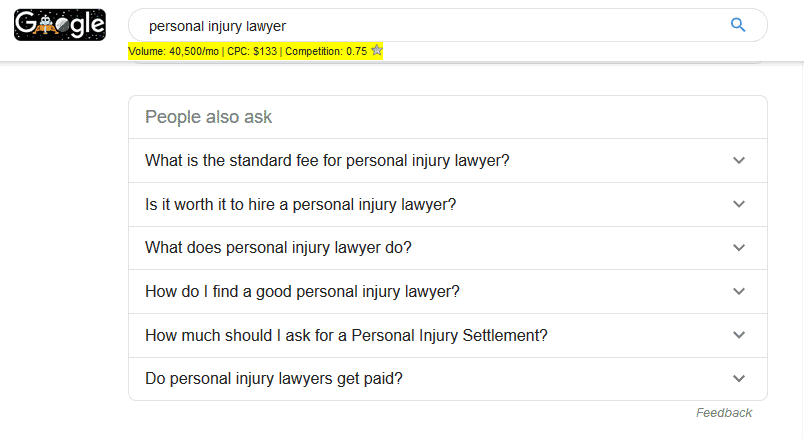
The same goes for the suggestions that Google puts at the end of a search page. Keywords Everywhere would tell you how many searches they get, so you can pick the ones that do get a decent number of searches.
Then there’s Google’s auto-suggest feature as you type in a particular search query. The below image would clarify well what we actually mean here.
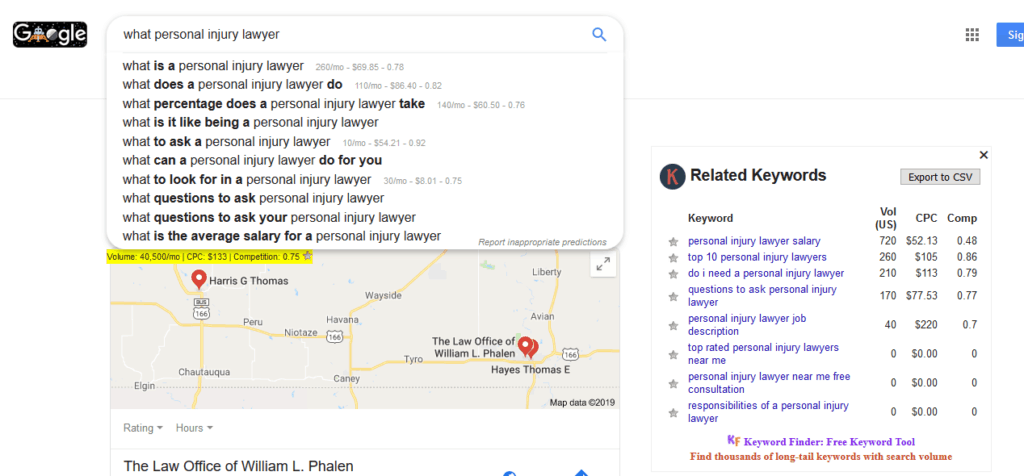
Finally, the method we explained above using SEMrush would also work great in a large enough niche. All you need to do it put in your competitor’s website into the tool and find the keywords they are ranking for.
Analyzing the Keyword Competition
Finding relevant keywords is not everything. You also need to be aware of the competition for those keywords, so that you have a realistic chance of ranking for them.
Let’s face it. You aren’t going to be able to outrank sites like CNET if you’re a small, new competitor in the tech reviews niche.
While the keyword competition isn’t as important for small niches where you’re usually not competing with small businesses like yourself, it’s crucial for the bigger or other more general niches, such as an ecommerce site selling products that are commonly sold by other ecommerce sites as well.
Keyword research tools like SEMrush can help you get a general idea about the keyword difficulty, but they aren’t very accurate and can be pretty off at times.
However, it’s generally a good idea to avoid any keywords that show “too difficult” to rank for in these tools.
If the keywords show as “easy” or “moderate” you can continue with your research.
Again, a simple way of figuring out whether a keyword is too competitive or not (after the keyword tool test), is to just search for it in Google and see what kind of sites are ranking for it.
Let’s go back to our example of the “best washing machine.” The sites ranking for this keyword in Google on the first page include some household names and multi-million or billion dollar businesses, including CNET.
It’s important to note that a keyword that’s longer is usually much easier to rank for, and the same goes for an informative keyword. These keywords may not be as profitable as the bigger, more competitive keywords, but they add up over time and help you increase your brand authority, eventually letting you have a better shot at those bigger keywords too.
So again, as an example, let’s take a much longer keyword “pros and cons of automatic washing machine” instead of “best washing machine.”
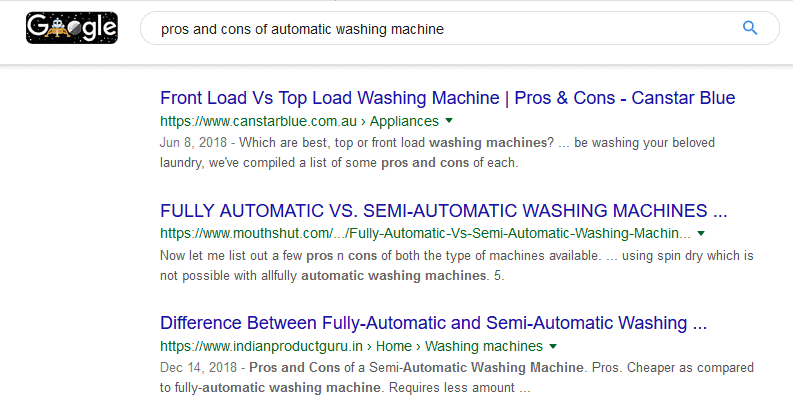
The top sites ranking for it include Canstarblue Australia, MouthShut and IndianProductGuru. These are incredibly low competitive to beat than something like CNET, that ranks for “best washing machine.”
Sure, this keyword doesn’t get as many searches as “best washing machine,” but you can rank for tons of such keywords easily. The good thing is that the user intent for both these keywords is not much different, as you can still sell the product to people searching for “pros and cons of automatic washing machine” with a good conversion funnel and some smart content marketing.
That’s Enough to Do Some Serious Keyword Research
If you’re a small or medium business owner, the information in this guide should allow you to do some really in-depth keyword research and find a ton of great keywords.
But don’t forget to optimize your website well using those keywords, as that’s how you would rank for them and start getting targeted traffic that would convert into customers and leads.
Similarly, you must also have a good lead capturing tool in place to make sure the increased targeted traffic your site has started generating doesn’t count for nothing.
MailOptin can help you with this without making you go crazy like other tools as it’s incredibly easy to set up yet surprisingly well-optimized to capture the most leads and get the most out of your targeted traffic.
